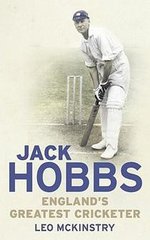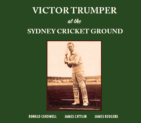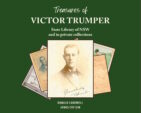Jack Hobbs – England’s Greatest Cricketer
Archie Mac |Published: 2011
Pages: 408
Author: McKinstrey, Leo
Publisher: Yellow Jersey Press
Rating: 4 stars

“Boycs” written by Leo McKinstry in 2000, is one of the finest modern cricket biographies. This meant the next cricketing biography by McKinstry, especially when there was over a decade between the books, was not only going to be eagerly anticipated but would be compared to his highly successful first effort. Unfortunately although well written and thoroughly researched, his biography of Jack Hobbs never quite reaches the heights of “Boycs”. Author Leo McKinstry summed it up in the acknowledgements when he wrote “when I researched a biography of Geoff Boycott twelve years ago, much of the book was made up with first-hand testimonies.”
This lack of firsthand testimony denies the author the chance to present very much new information. This is understandable, with three ghosted biographies and two hagiographies written by Hobbs devotees in John Arlott and Ronald Mason, there was not much left to say. Also Hobbs did not court publicity in the manner of the GLY*, nor did he polarise contemporary press as Boycott always did. And when it came to pronouncing judgement on the game and fellow players Hobbs in comparison to Boycott was not just a fence sitter, he was nailed to the palings.
Despite these shortcomings and a few annoying typos, McKinstry has written the definitive biography about the ‘Master’. He has especially presented for the first time a detailed examination of Hobbs involvement in the Great War. Hobbs has always been considered to be a bit of a shirker when it comes to his war record, preferring as he did to initially play league cricket rather than join the army. McKinstry provides a balanced and well researched account of Hobbs’ war years and finds some still raw extended family resentment regarding injuries suffered to his serving brothers, despite the passage of 90 years.
The Hobbs relationship with his large extended family after he rose from an impecunious upbringing to a man of means is the one undercurrent throughout the book which paints Hobbs in a penurious light. This is outweighed by his many kindnesses to fellow players and fund raising for charities, as well as his devotion to his own family especially his wife.
The author’s depiction of Hobbs and his dedication to his wife puts flesh to the run machine. Although barely hinted at in other biographies – I think Mason mentions her once – McKinstry uses her to really show the frailties and human side of Sir Jack.
Although these peripheral issues are well written and of interest it is the Hobbs the cricketer who is the reason the book was embarked on and here the author misses nothing, covering every controversy of Hobbs’ career as well as his triumphs. McKinstry does not merely record he offers opinion when appropriate.
Perhaps in the end it is unfair to compare “Jack Hobbs England’s Greatest Cricketer” to “Boycs” – they are two very different characters and in the end therefore are by necessity very different books.
Leo McKinstry is a fine writer and he has done justice to the legend of Jack Hobbs. If after reading this book you do not think Hobbs the finest opening batsman in the history of the game, you are hard to please.
*Greatest Living Yorkshireman






Leave a comment